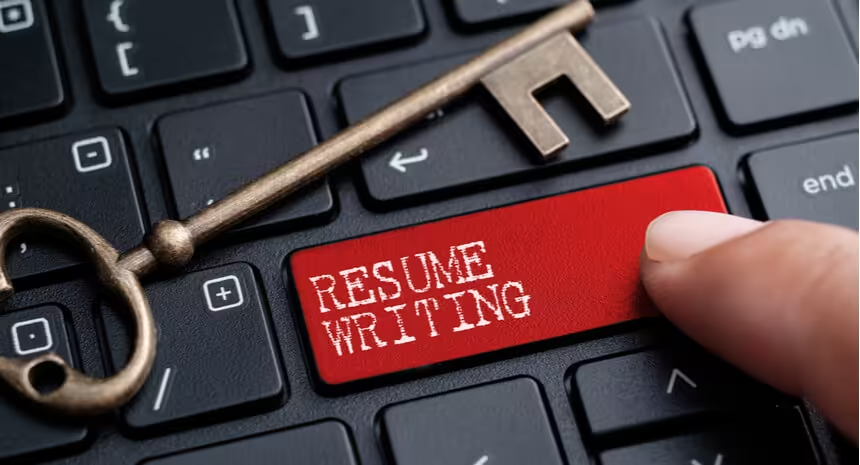Writing emails. Giving presentations. Listening to customers.
Almost everything we do in the modern workplace involves communication.
But how do you make sure you’re using your communication skills effectively, that they’re sharp and represented well on your resume?
We’ve put together a communication skills guide to answer all of your questions and more!
This guide will cover:
- The definition of communication skills.
- Top communication skills for the 2024 job market.
- How to list communication skills on your resume.
- How to improve your communication skills.
- Bonus resources for other skill sets.
Are you working on your resume? If so, have you considered using a AI resume builder? Builders are a great way to put together your resume quickly — and you’ll get hundreds of communication skills ideas you can list on your resume with a click.
What are communication skills?
Let’s say you’re a customer service agent working in a store. You greet customers warmly to make everyone feel welcome and listen attentively to their needs. Your body language makes it clear that you’re engaged and ready to help.
You’re displaying excellent communication skills. Communication skills are the exchange of information and ideas between people through speaking, writing and nonverbal cues.
Why are communication skills so important?
Good communication breeds understanding, better relationships and self-confidence. If you communicate well, you can solve problems, make important decisions and boost your professional growth.
On that note, communication skills are important in virtually every industry, from information technology (IT) to hospitality to sales. You can’t go wrong by building your skill set.
Next, we’ll help you identify some of the most common and critical types of communication skills.
45+ good communication skills examples
There’s more variety to communication skills than you might think. There are dozens of different types of communication skills, from verbal to nonverbal to interpersonal.
Most are soft skills, like storytelling or empathy, but others fit the hard skill mold, like your ability to use specific communication platforms. Let’s dive into some of the most important communication skills in today’s world.
Verbal communication
Talking is one of the most immediate ways we communicate with one another. From strangers to close friends, we rely on verbal communication to convey our thoughts, feelings and intentions clearly and effectively. Here are a few skills that fall under this umbrella.
- Listening
- Articulation
- Clarity
- Conciseness
- Persuasion
- Negotiation
- Public speaking
- Storytelling
- Questioning
- Summarizing
- Paraphrasing
Nonverbal communication
Nonverbal communication is the secret weapon of many of the best communicators in the world. There have been a number of studies on the subject, and they’ve found that somewhere between 70-93% of communication is nonverbal. That’s a lot! Below are some of the specific skills that fit the subject.
- Nonverbal cues
- Body language interpretation
- Tone analysis
- Visualization
Written communication
Writing well takes practice. When you nail it, though, the feeling is very rewarding. Here are a few skills that relate to the written word. See our guide on writing skills for much more detail.
- Writing
- Editing
- Reading comprehension
Interpersonal communication
How we relate to one another one-on-one is so important, whether you’re courting a new relationship or trying to collaborate in the workplace. Mastering these skills can lead to more effective teamwork, improved relationships and a deeper understanding of those around us.
- Empathy
- Assertiveness
- Giving feedback
- Receiving feedback
- Emotional intelligence
- Conflict resolution
- Diplomacy
- Influence
- Rapport building
- Team collaboration
- Facilitation
- Mediation
- Humor
- Patience
Cognitive skills
If communication skills are a car, your brain is behind the wheel. Cognitive skills fuel our ability to process information, make decisions and solve problems. Below are the cognitive skills that relate most closely to communication.
- Open-mindedness
- Problem-solving
- Decision-making
- Critical thinking
- Adaptability
- Cultural sensitivity
- Instruction
Communication tools
Finally, we wouldn’t want to leave out the communication platforms present in today’s workplace. This list is far from exhaustive, but it highlights some of the most important tools in the digital age.
How to list communication skills on your resume
What’s the point of skills if you don’t have anywhere to put them? That’s where your resume comes in.
Your resume is the perfect forum to showcase your communication skills, demonstrating to potential employers that you have the expertise and experience to excel in the role you’re applying for. Let’s break it down step by step.
Step 1Highlight skills from the job description
First thing’s first — read the job ad a couple of times.
The job ad will reveal many things, including the precise skills the employer is looking for. These skills also act as keywords.
Companies program keywords into an applicant tracking system (ATS) to filter out unqualified applicants. It’s a way to avoid having to sort through the avalanche of resumes that come in after they post the job.
You can turn this to your advantage by including the relevant keywords in your resume.
Here’s how to identify communication skills in the job description (skills are in bold):
We are looking for a marketing coordinator to join our dynamic team. The ideal candidate will have strong organizational skills, excellent written and verbal communication abilities and the capacity to manage multiple projects simultaneously. Responsibilities include coordinating various marketing projects, liaising between departments and ensuring that all communications align with our brand’s voice. Team collaboration, presentation skills and stakeholder management are essential for success in this role. Experience in digital marketing and social media strategy is a plus.
Next, we’ll show you what to do with the highlighted keywords.
Step 2Create at least one skill section
Alright, what to do with the skills from the job ad? Your skills section is a great place to start.
There are many different ways to name your skills section. You could get specific with a title like “Core Competencies” or go super simple with a header like “Skills” — either one works well.
If you’re making a functional resume, which usually has more than one skills section, you can get creative with the headers to show the true breadth of your skill set. For example, you might have a section entirely devoted to computer skills.
Utilize bullet points to organize your skills section, making it much easier for hiring managers to read and understand at a glance.
Add the skills in each section of your resume
After you deal with the skills section, look to the rest of your resume as a possible outlet for your skills.
There’s your professional summary or resume objective at the top of your document. Even better is the work experience section. If you’ve held a few jobs, your work history should provide many, many chances to add skills.
Here’s what skills look like in your professional summary:
Dynamic marketing specialist with over five years of experience in fast-paced marketing environments. Proven track record of enhancing team communication and collaboration, managing multiple high-stakes projects with efficiency and delivering compelling presentations. Adept at written and verbal communication, with a keen ability to negotiate and manage relationships with key stakeholders. Skilled in digital marketing strategies and social media campaigns, consistently ensuring brand coherence across all platforms.
Even your education section can include skills. Simply add a list of relevant coursework or special projects completed while you were in school.
Add skills to your cover letter
Ultimately, you’ll need to go beyond your resume. In addition to adding skills to your resume — and highlighting them in your interview — weave some skills into your cover letter.
When you sit down to write your cover letter, consider how your communication skills have helped you in previous roles. Tell a story that shows how you successfully navigated a challenging conversation with a client that led to a strengthened relationship.
Finally, if you aren’t sure where to start with cover letters, consider looking at some cover letter examples. You just might find inspiration.
How to improve your communication skills [training + courses]
Since communication is so important, there are literally thousands of ways to improve this skill set. Try something from the list below — or sample a few of the options. See what works best for you. There’s no single right way to learn.
Take online courses or training workshops
Many people find online training courses very helpful. There are several platforms leading the way in providing a range of classes. Keep in mind — this list isn’t exhaustive. A quick Google search will turn up many more.
- Coursera: Offers courses in partnership with universities and organizations around the world, covering topics from public speaking to effective communication in the workplace.
- Udemy: A wide range of communication courses covering everything from interpersonal skills to business communication and public speaking.
- LinkedIn Learning: Features courses on various aspects of communication, including persuasive communication, negotiation and conflict resolution.
Engage in public speaking
What better way to improve your communication skills than practicing in front of strangers? Join a club like Toastmasters or take part in workshops where you can try out your skill set in a supportive environment.
Participate in improv classes
Give improv a try! Some may find the challenge of thinking on your feet and putting yourself out there in such a vulnerable situation a fast-track way to improve your communication skills. Here are some famous improv groups you could investigate if you live in a city. Others may want to check local community centers, theaters or even online platforms for improv classes accessible from anywhere.
- The Second City
- Upright Citizens Brigade (UCB)
- The Groundlings
- The People’s Improv Theater (The PIT)
- ImprovBoston
Familiarize yourself with communication tools
Communication comes in many different forms. Expanding your knowledge of popular communication tools will help you communicate in different contexts.
- Email platforms like Gmail and Outlook.
- Instant messaging and collaboration platforms like Slack and Microsoft Teams.
- Project management tools like Trello, Asana and Monday.com.
- Social media platforms like LinkedIn, X and Facebook.
- Video conferencing tools like Zoom, Skype and Google Meet.
- Document collaboration tools like Google Docs and Microsoft 365.
- Feedback tools like SurveyMonkey and Google Forms.
Improving your communication skills is totally feasible — anyone can do it with a little bit of practice.
More skills resources
Haven’t found what you’re looking for? Maybe one of our other skills guides can help:
Communication skills — key takeaways
-
Communication is a critical skill for growth
In every aspect of life, the ability to convey ideas clearly and understand others profoundly is invaluable, whether you’re aiming for personal or professional success.
-
Experiment with communication platforms
Familiarity with platforms like Slack, Zoom and LinkedIn can enhance your ability to connect with colleagues and industry peers, making you more versatile.
-
Communication is more than talking
It’s also about listening and understanding nonverbal cues. Effective communicators are those who can listen actively, interpret body language and empathize with others.
-
It’s never too late to improve your communication skills
From taking classes to joining Toastmasters, there are countless opportunities to refine and enhance your ability to express yourself and understand others.
Was this information helpful? Let us know!
Don is a Certified Professional Resume Writer (CPRW) with more than 10 years’ experience creating digital content, including four years helping job seekers develop their careers. He holds an M.S. in Journalism from Northwestern University.
More resources

How to Write a Resume: Guide & Examples for 2025
If you re wondering how to write a resume that grabs attenti...

Should You Put Your Address on Your Resume? (Guide + 5 Example Resume Headers)
Should you put your address on your resume? We ll answer you...

Driver Cover Letter: Examples, Templates & Writing Tips
Write a driver cover letter that puts you on the road to succe...

Security Guard Cover Letter: Examples, Templates & Writing Tips
Need a security guard cover letter that helps your application...


